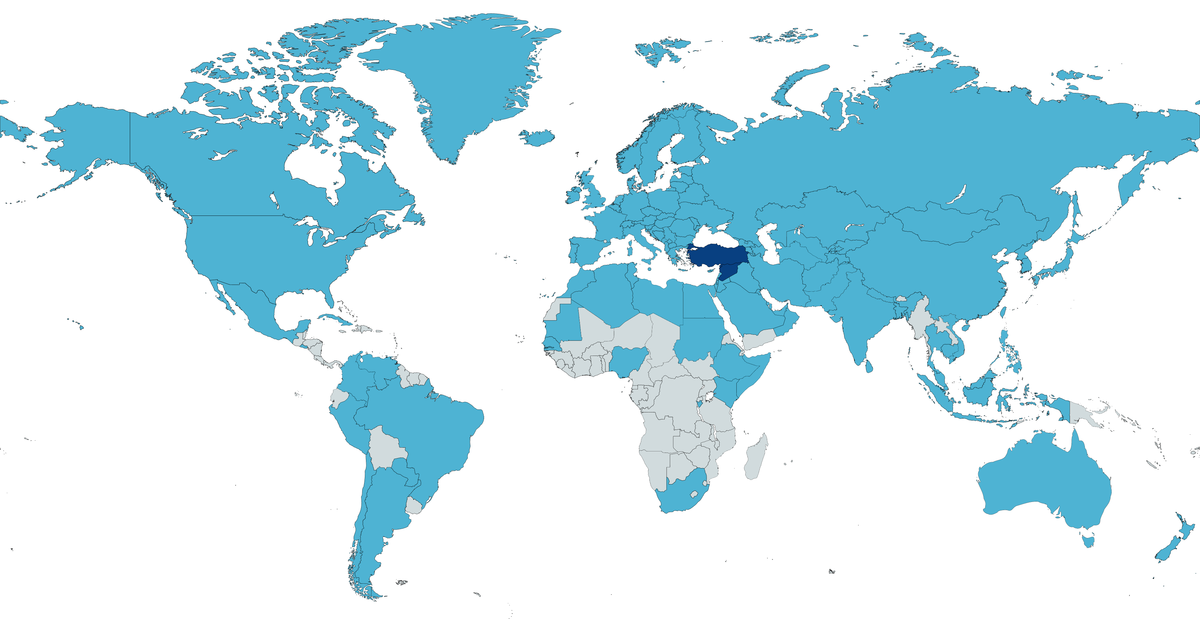An article from yesterday, which highlights the problems Erdogan is facing as voices are raised about the earthquake response. Elections are scheduled for May 14th.
The full impact of the recent earthquake that hit both Turkiye and Syria has yet to be fully assessed, but the Turkish Republic has already sustained significant damage that could have long-lasting political effects.

thecradle.co
Amid Turkiye’s rubble lies Erdogan’s political fate
The full impact of the recent earthquake that hit both Turkiye and Syria has yet to be fully assessed, but the Turkish Republic has already sustained significant damage that could have long-lasting political effects.
By
Ceyda Karan
February 13 2023
Photo credit: The Cradle
“We are being tested day and night by the absence of something that tries to make us believe in its power, might and greatness. (No, it’s not God).”
These words expressed by Dr. Fatih Yaşli, an academic from Bolu Abant Izzet Baysal University, describes the feeling of many Turks who were shocked by the devastating earthquake which ripped through the country’s southern regions and neighboring Syria on 6 February, 2023.
The two earthquakes with magnitudes of 7.7 and 7.6 which hit the Pazarcik and Elbistan districts of Kahramanmaras not only destroyed entire neighborhoods, but, within 24 hours, also ravaged Turkish perceptions of the so-called “omnipotent state” created by President Recep Tayyip Erdogan.
The state’s failure
People were left wondering
“Where is help, where is the state?” as they waited desperately under the rubble, while the nation’s infrastructure – once the pride of the Erdogan administration – lay in ruins. The lack of proper relief campaigns and inaccessible cities due to adverse weather conditions added to the suffering of the affected population.
The Gaziantep-Adana highway was in ruins. The newly opened bridge in Malatya collapsed, and the airport, whose terminal roof was damaged, was closed to civilian flights. Hatay (Antioch) could not be reached by air because the airport’s runway, built on the Amik plain despite the warnings of scientists, took heavy damage. Most of the hospitals in Hatay where the wounded headed had collapsed. The town halls no longer existed.
The trauma created by the earthquake, which
impacted 10 provinces in Turkiye, was enormous. This was compounded by the realization that help from the state failed to show up in their time of need.
The video shot by Bolu Mayor Tanju Ozcan, who reached Elbistan 24 hours after the earthquake, showed the frantic state of survivors still waiting for help. While the leveled city was covered with a white blanket of snow, Özcan explained that the few aid workers who existed could do nothing. “There are live people here,” he said, pointing to the wreckage.
The 7.4-magnitude Golcuk earthquake that hit Istanbul in 1999 had also shaken the nation with the desperate cries of those trapped in the rubble – and forever altered national politics in its aftermath.
Many who remembered the backlash against authorities during the 1999 catastrophe were shocked to realize that there was actually a functioning state present at that time. The failure to respond to this latest disaster has raised questions about the government’s preparedness and ability to provide assistance in times of crisis.
Inadequate disaster response
Turkiye’s Disaster and Emergency Management Agency (AFAD), under the Ministry of Interior, is responsible for handling national disasters and emergencies. Unlike many other countries where disaster response executives are military experts, AFAD executives in Turkiye are mostly Imam-Hatip (religious school) graduates with questionable qualifications. The agency was also criticized for being understaffed and having major coordination issues.
In the first critical hours after the earthquake, AFAD officers either never arrived at the wreckage or came to only take notes. The lack of available equipment, such as cranes and construction equipment, made it difficult to reach the affected areas.
Experienced miners in the Black Sea region were not dispatched until 48 hours after the earthquake. In contrast, the Turkish Armed Forces (TAF) were deployed within a short period of time during the 1999 Golcuk earthquake, but only 3,500 soldiers were deployed in the first 24 hours this time round.
Civil mobilization and social media bans
On 7 February, the Turkish government declared a state of emergency (OHAL) in the disaster zone and a week of mourning. Despite the outpouring of support from the opposition municipalities and civil society, the government faced criticism for its slow response and lack of preparation. In addition, the Turkish Red Crescent was virtually absent on the ground.
Erdogan responded to criticism by lashing out and claiming that he would address the “lies” and “distortions” leveled at his administration in due course. However, the very next day, social media, which was being used by civil society to save lives via search and rescue posts, was shut down, causing immense outrage.
Access was restored only after celebrated Turkish singer Haluk Levent, known for his charity work, called out the authorities and referred to the social media ban as “equivalent to murder.”
The role of the Turkish army
Perhaps the most controversial issue was the response of the Turkish Armed Forces (TAF) to the catastrophe. Despite the presence of
50 thousand Turkish soldiers in Syria, only 3500 troops were deployed in the first 24 hours after the earthquake.
Minister of National Defense Hulusi Akar was correct when he explained that Turkish troops were delayed due to weather conditions and destroyed land routes. But the failure of President Erdogan to effectively mobilize the TAF did not go unnoticed.
Retired officers who took part in the relief efforts for the 1999 Golcuk earthquake had raised warnings in the early hours of this month’s disaster. Retired Rear Admiral Cem Gurdeniz called for amphibious ships to be sent to the Iskenderun Bay to help Hatay. Meanwhile, teams from countries such as Russia, Spain, and Israel had already established field hospitals.
Experts pointed to the fact that the TAF’s ability and capacity to respond to such disasters had been significantly reduced after and even before the 2016 attempted coup. The closure of the prestigious Gülhane Military Medical Academy (GATA) was cited as an example.
Retired Admiral Turker Erturk, former Black Sea commander, emphasized the importance of the army’s role in both responding to natural disasters and external threats, stating:
Elections and the fate of Erdogan’s AKP
Erdogan’s 20-year term at Turkiye’s helm was built on the wounds inflicted by the 1999 Golcuk earthquake. Ironically, his political downfall could now be brought about by the 2023 one.
On 9 February, a Turkish official informed
Reuters that “there are serious difficulties ahead of holding the
elections on May 14.” President Erdogan’s mandate only allows him to postpone the elections in case of war, which requires the approval of his opposition. However, there are already suggestions that he may use the state of emergency as a delaying tactic.
Erdogan may have already hinted at this, without directly mentioning the elections: “We believe that we will complete this process, which means the construction of hundreds of thousands of houses with their infrastructure and superstructure, in a short time. I want one year from you.”
Orhan Bursali, a columnist for
Cumhuriyet Daily, is of this opinion, as he believes Erdogan fears significant losses if they were to proceed on schedule. Bursali cites Turkiye’s poor economic conditions and corruption as reasons for this calculation.
“Now, this great earthquake has created the natural conditions for postponing the election. This opportunity is in the pocket of the Palace,” he said.
Dr Fatih Yaşli, on the other hand contends that Erdogan’s authority to postpone the elections is only in question “in case of war,” which he considers a remote possibility, even if the president manages to strike a compromise with the opposition.
Yaşli posits that the construction-oriented economy and politics based on rent distribution adhered to by Erdogan’s Justice and Development Party (AKP) for 20 years have collapsed with this earthquake. He points out that Turkish anger is not limited to the earthquake-struck regions and can be observed countrywide, disrupting the president’s carefully laid plans:
Ramifications on foreign policy
Foreign policy analyst and political scientist Aydin Sezer warns that Erdogan’s AKP is facing a difficult situation and cannot evade the issues by hiding behind the magnitude of the earthquake – or linking the destruction to “fate and religion” and distributing cash to placate the public, as in the past.
Sezer argues that “the election is not just about the transfer of power, it’s a matter of survival for the AKP.” This could compel Erdogan to create an urgent, dire situation in Syria that can be interpreted as a “war.”
In light of these circumstances, it is crucial to understand the delicate state of Turkiye’s relations with its western NATO allies, particularly in regard to Syria.
While the earthquake brought together the destinies of Turkiye and Syria in mere minutes, it is significant that Ankara did not respond to calls to open its borders and create an air corridor for aid outside the territories controlled by Turkish ally and Al-Qaeda-affiliate, Hayat Tahrir al-Sham (HTS).
Before the earthquake, Turkiye had established contact with Damascus through Russian mediation, which had already drawn the ire of Washington. The Joe Biden administration has openly objected to any potential reconciliation between Ankara and Syrian President Bashar Al-Assad.
The recent earthquake in Turkiye and the ongoing election agenda have sparked a heated debate about the direction the country is heading in. With the Biden administration objecting to Ankara’s Syria policy, and the financial burden of the earthquake, there is now immense political and economic pressure on the Turks to participate in sanctions against Russia.
Turkiye’s economy, which was already struggling with high inflation, high exchange rates, and falling living standards, is estimated to have suffered a financial loss of more than $100 billion due to the earthquake. The affected zone accounts for 8.7 percent of the country’s exports, worth $19.76 billion, and there is a risk of a decrease in production and exports, as well as a new wave of migration from the region.
Post-quake Turkiye?
In this context, long-term loans from the International Monetary Fund (IMF), World Bank, and EU are being discussed. The US and EU still need NATO-member Turkiye, but they do not consider President Erdogan a reliable partner in the alliance.
This disaster is likely to affect the political and economic balances in Turkiye, and the outcome domestically is unclear. Erdogan’s first move after the earthquake was to phone the leaders of the right-wing parties in the Turkish opposition bloc – excluding the leader of his mainstream opposition, the social-democratic Republican People’s Party (CHP) – raising the possibility of a right-wing “national unity government.”
This scenario would mean a new Turkish re-alignment with the west and the US. Postponing the elections until autumn by reconciling with the opposition would maintain the policy of balance between the west and the east, while indefinitely postponing them would reinforce the notion of pivoting toward the east.
Turkiye faces a complex political and economic situation, and it is unclear which direction the country will take in the short term. In the meantime, the Turkish people are experiencing the trauma of this uncertainty, and the absence of the “sacred state.”





